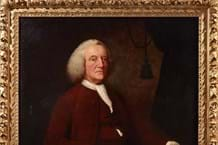The discovery at Reynard's Kitchen Cave in Dovedale, Derbyshire, was on National Trust land and the charity carried out a full excavation after an initial find of four coins was made by a member of the public.
"In total we found 26 coins, including three Roman coins which pre-date the invasion of Britain in 43AD," said NT archaeologist Rachael Hall.
"Twenty other gold and silver coins are Late Iron Age and attributed to the Corieltavi tribe. The tribe is more usually associated with occupying areas further east during the Late Iron Age, where the tribal centres are thought to be Leicester, Sleaford and Lincoln, so it is interesting that this find is where it is in Derbyshire. Could this area have been a previously unknown power base of the Corieltavi tribe?"
This is thought to be the first time a hoard of this type has been found in a cave. "The coins would suggest a serious amount of wealth 'power' of the individual who owned them," said Ms Hall. "Coins were used more as a symbol of power and status during the Late Iron Age rather than for buying and selling staple foods and supplies. Was an individual simply hiding his 'best stuff' for safe keeping? Or, perhaps speculating, in the hope that the value would increase in the future, like a modern-day ISA?
"The situation of the cave can't be ignored either. Could it have been a sacred place to the Late Iron Age peoples that was taboo to enter in everyday life, making it a safe place that would ensure that person's valuables were protected?"
The coins, declared treasure and recently cleaned at the British Museum and University College London, will go on permanent display at Buxton Museum later this year.





